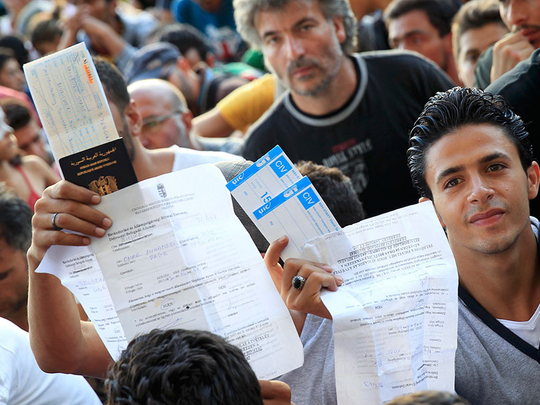
London: Tens of thousands of British people petitioned their government to do its part to help an unprecedented influx of refugees fleeing war and violence to safety in Europe on Wednesday.
A parliamentary petition calling on the conservative government of Prime Minister David Cameron to accept more asylum seekers gained over 40,000 signatures after a photo of a drowned child on a beach in Turkey went viral.
"There is a global refugee crisis. The UK is not offering proportional asylum in comparison with European counterparts," the petition read.
"We can't allow refugees who have risked their lives to escape horrendous conflict and violence to be left living in dire, unsafe and inhumane conditions in Europe."
The government is obliged to respond as the petition with over 10,000 signatures, and if it reaches 100,000 the issue will be considered for debate in parliament.
The petition reached 46,600 signatures by the end of Wednesday.
A separate change.org petition calling on Home Secretary Theresa May to give "immediate sanctuary to refugees fleeing war and violence" gained 135,000 signatures in four days.
Newspaper The Independent launched its own campaign on Wednesday, calling for Britain to "accept its fair share of refugees", which gained 13,600 signatures in hours.
Opposition politicians have called on Cameron to increase the numbers of refugees accepted in Britain, which accepts a lower number of asylum seekers as a proportion of its population than most other EU countries.
The issue of immigration is one of Britain's most sensitive political issues.
Cameron faced criticism over Britain's acceptance of under 6,000 Syrian refugees, after Germany said it expected to receive 800,000 asylum seekers this year.
But the prime minister insisted on Wednesday that a solution would not be found "simply by taking more and more refugees".
The British government resisted calls for a quota system to share refugees across the 28 member states of the European Union this summer.
Undermining?
The influx of refugees into Europe threatens to undermine the continent's Christian roots and governments must control their borders before they can decide how many asylum seekers they can take, Hungarian Prime Minister Viktor Orban said.
In an opinion piece for Germany's Frankfurt Allgemeine Zeitung, Orban said the people of Europe were at odds with the majority of governments on the refugee crisis.
"The people want us to master the situation and protect our borders," he wrote. "Only when we have protected our borders can questions be asked about the numbers of people we can take in, or whether there should be quotas."
Refugees languish in Spain
The only thing that stands between Bashar Haousheh and Germany is his prized bass guitar.
Aside from the clothes on his back, a mobile phone in his pocket and EURO5 in cash, the instrument is the last thing the 25-year old Syrian refugee possesses. But, if the money is right, he will sell his guitar to pay for the final leg of a voyage that has taken him from the war-scarred city of Latakia to a gloomy hostel on the outskirts of Madrid.
"Everyone wants to go to Germany. The only reason why refugees are still here in Spain is because they are stuck," says Mr Haousheh, as he surveys the neon-lit common room where he and a group of fellow refugees from Syria, Afghanistan and Iran spend their days.
The young men who sit around him agree. Some say they can't leave because of sick family members. Others face the same problem as Mr Haousheh: they still have to scrape together the few hundred euros that will take them to their final destination. Not one says he has plans to stay in Spain.
There are good reasons to head north. As the European refugee crisis continues to escalate, Germany has quickly gained a reputation - especially among Syrian refugees - as the most generous of host nations.
Not only is there no risk of being sent back into the Syrian war zone, but Berlin has also promised not to return refugees to the European countries where they first arrived. The fact that so many Syrian refugees have already found shelter in Germany acts as a pull factor in itself, as relatives and friends try to reunite.
In the case of Spain and other southern European countries, however, there is at least one other crucial incentive to leave: many refugees no longer have access to food, shelter and other basic services. "After six months, you don't get anything. Spain simply throws you out into the street," says Mr Haousheh.
Contrast
The contrast between the services provided to refugees in Germany and Spain is striking.
Under German legislation, buttressed by a recent ruling from the constitutional court, refugees are guaranteed a minimum level of subsistence (shelter, food, housing, medical attention) for as long as they reside in the country. In addition, they must be given the means to participate - in a basic way - in public life and society. For this, they receive monthly cash payments of up to EURO140 per person.
In Spain, meanwhile, refugees are placed in reception centres for six months, during which they are entitled to shelter, food, clothing, legal aid and counselling. In theory, that phase can be prolonged if there are exceptional circumstances, says Spain's ministry of labour. In practice, budget constraints make that all but impossible, say aid workers and refugees.
In a statement issued last month, the UN refugee agency (UNHCR) took aim at the conditions imposed on refugees in Spain. It said that both the "duration of the programmes and the actual infrastructure" available in the country did not provide an "adequate response to the needs of asylum seekers".
Critics argue that six months of adjustment and support are simply not enough to allow refugees to enter the job market - especially in a country where the unemployment rate still stands at more than 22 per cent. "In our view, it is impossible to obtain the basic tools that would allow you to take care of yourself in just six months. In six months, it is practically impossible even to learn the language well enough," says Estrella Galan, the secretary-general of Spain's CEAR refugee council.
With a general election only months away, Spain's role in the refugee crisis is emerging as an increasingly contentious campaign issue.
On Monday, the opposition Socialists lashed out at the government of Mariano Rajoy, accusing Spain's conservative leader of shirking his responsibilities. "The government does not want us to welcome people who are fleeing from war," said Antonio Hernando, a senior party leader, adding that Spain's response to the migrant crisis had been "shameful".
Soraya Saenz de Santamaria, deputy prime minister, defended the government's stance, arguing in a radio interview this week that the country's "capacity to receive [refugees] is very much exhausted".
The data, however, suggests that Spain is doing far less than many of its European peers. In the first quarter of this year, the country received just 2,000 asylum applications, a little over 1 per cent of the EU total.
Fewer than half
Madrid has committed itself to accept an additional 2,749 refugees who currently reside in third countries, fewer than half the number requested by the European Commission.
Germany, in contrast, expects to receive as many as 800,000 refugees this year - prompting urgent demands in Berlin for other countries to share more of the burden.
Among the refugees biding their time in Madrid, meanwhile, there is hope that the journey that lies ahead will be their last. Mr Haousheh, for one, insists he is never going back home. "There is nothing left to do in Syria. Even if the war ends, the country is destroyed."











